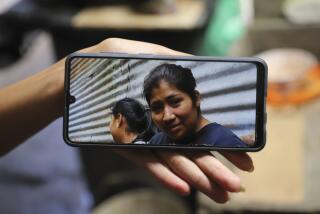Briefing Paper : Death in Salvador: The War Resurfaces
The News:
In an unwelcome reminder of an almost-forgotten war, three U.S. Army airmen, including one from San Diego, died in El Salvador last week after their helicopter was forced down by gunfire from leftist rebels. Autopsies on the three men performed by U.S. military forensic experts showed conclusively that two of the men died of bullet wounds to the head fired at close range. The Bush Administration charged that two of the three men were murdered in cold blood after they landed. The rebel alliance, the Farabundo Marti National Liberation Front, or FMLN, contended that its fighters found one of the victims dead at the scene and tried to get first aid to the others before they died of their injuries.
Like the deaths of 29 other Americans in El Salvador’s 10-year-old civil war, these have already become a political issue. State Department spokesman Richard Boucher said the incident cast doubt on the rebels’ commitment to peace negotiations with the conservative government currently under way in Mexico City. “This FMLN action comes at a time when the FMLN claims to be interested in reaching agreements to end the war. Once again, the guerrillas’ actions belie their words,” Boucher said.
Both U.S. and Salvadoran officials are investigating the circumstances of the airmen’s deaths. But experience suggests that the truth will be elusive, and the facts contested for some time to come.
The Background:
The Defense Department said the three airmen were flying a routine “ferry” mission in their Huey UH-1H helicopter from the Salvadoran capital, San Salvador, to a U.S.-Honduran air base at Soto Cano, Honduras. They were among roughly 1,200 U.S. military personnel based in Honduras, not the roughly 100 American servicemen based in El Salvador.
Formally, the number of U.S. military advisers in El Salvador is limited to 55 under an accord between Congress and the White House that was struck under President Reagan in 1981. But in fact, the Pentagon has construed the limit of 55 to apply only to full-time trainers who remain in El Salvador longer than 30 days at a stretch. Other military trainers and advisers move in and out of the country at varying intervals; many of them are based in neighboring Honduras, where there is no such limit on U.S. force levels.
Some of the U.S. advisers are attached to Salvadoran combat units in the country’s embattled provinces; they work closely with the units’ officers and men but are forbidden to accompany them on combat operations. Others advise the Salvadoran military’s high command in the capital.
The military training program was launched under President Jimmy Carter in 1980, when the rebels first mounted a military offensive against the government. It has been controversial ever since, largely because of convincing evidence that elements in the Salvadoran military were responsible for indiscriminate attacks on civilians and assassinations of opposition figures.
On Human Rights:
The United States has long supported conservative (and sometimes repressive) governments in El Salvador, but the policy was not controversial until the civil war began in 1980. First Carter, then Reagan and now President Bush declared the defeat of the Marxist rebels to be an important interest of the United States.
All three administrations have promised to reform the Salvadoran government and to stamp out the rightist “death squads” that have killed thousands of suspected leftists, but the reforms have remained incomplete. In November, 1989, for example, a squad of Salvadoran soldiers murdered six Jesuit priests, their cook and her daughter at a university campus in San Salvador; eight soldiers and one officer are awaiting trial, but the case appears mired in manipulation and intrigue.
Still, the United States has maintained the flow of military and economic aid without interruption. The Bush Administration, like its predecessors, contends that a rebel victory would be worse than the continued rule of the Salvadoran government and military.
“After five democratic elections, El Salvador has changed profoundly in the last decade--but it has not changed enough,” Assistant Secretary of State Bernard Aronson wrote recently. “ . . . We don’t want to whitewash the continuing atrocities of the political right. But we will not confront the atrocities better if we fail to acknowledge real progress; we will only undermine those responsible for democratic change and demoralize ourselves. The vast majority of Salvadorans do not want the United States to walk away; they want us to use our influence more effectively and decisively to stop abuses of human rights.”
Opponents of the policy contend that U.S. aid has failed to produce significant reform and argue that a cutoff of aid is more likely to work.
New U.S. Aid:
This week, President Bush is sending Congress a report on conditions in El Salvador to determine how much military aid will flow to the military there. If Bush formally declares that the FMLN has turned its back on peace talks or is engaged in attacks on civilians, he can release $42.5 million in additional aid.
The report was one of several requirements that Congress attached to its $85-million military aid bill last year. Under the law, all $85 million of the aid was blocked unless Bush reported that the Salvadoran government was making a good-faith effort to negotiate with the rebels, prosecute the killers of the Jesuits and enact other reforms. Half the aid (or $42.5 million) was blocked unless Bush reported that the FMLN was refusing to cooperate with peace efforts or engaging in other abuses.
The Death Toll:
Including the three airmen, 32 Americans have died in El Salvador’s civil war. Of those, 15 were U.S. military personnel. Nine died as a result of hostile action by the rebels, and six died in a 1987 helicopter crash in bad weather.
Other Americans who have died include three Roman Catholic nuns and a church lay worker who were abducted and murdered by Salvadoran National Guardsmen in 1980, and two AFL-CIO labor advisers who were gunned down by National Guardsmen in 1981.
About 73,000 Salvadorans have also died.
More to Read
Sign up for Essential California
The most important California stories and recommendations in your inbox every morning.
You may occasionally receive promotional content from the Los Angeles Times.










